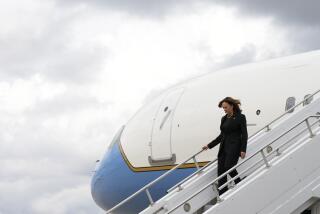Three Secret Service agents dismissed amid scandal
WASHINGTON — Three Secret Service agents implicated in a prostitution scandal in Colombia — including two supervisors — are leaving the agency as investigators seek to determine whether the embarrassing episode led to a security breach.
Officials said it appeared that none of the 11 Secret Service agents who allegedly brought prostitutes to their hotel rooms in Cartagena before President Obama arrived for the Summit of the Americas last weekend had weapons, radios, schedules or other potentially sensitive material in their rooms. They were not part of the elite unit responsible for guarding the president.
Paul Morrissey, assistant director of the Secret Service, said in a statement Wednesday that one agency supervisor was allowed to retire, another was “proposed for removal for cause,” and a nonsupervisory employee had resigned amid the widening repercussions of a case that has discomfited the White House.
Morrissey said the supervisor being fired had 30 days to appeal and the right to private legal counsel. None of the three was identified.
Morrissey said that the inquiry was in its early stages and that it involved “all investigative techniques available to our agency.” That includes polygraphs, interviews with the agents and supervisors involved, and witness interviews conducted in Cartagena, he said.
Eight other agents implicated in the incident are on administrative leave. Their security clearances have been suspended pending the outcome of the inquiry.
“Since these allegations were first reported, the Secret Service has actively pursued this investigation, and has acted to ensure that appropriate disciplinary action is effected,” Morrissey said. “We demand that all of our employees adhere to the highest professional and ethical standards and are committed to a full review of this matter.”
Ten members of the U.S. militarywho also stayed at the hotel face a separate Pentagon investigation on charges of misconduct.
The agents and military members were part of a team sent to Cartagena to help secure government buildings and other facilities before Obama’s arrival.
Investigators have identified and begun to interview at least 20 women believed to be prostitutes who were brought into the hotel. Officials knew who they were because they were required to leave personal identification at the front desk. Local police were called after a disturbance broke out, reportedly over whether one of the prostitutes would get paid.
The scandal overshadowed the summit. Obama said at a news conference in Cartagena on Sunday that he would be angry if the allegations were true because he expected representatives of the U.S. government to act with “the utmost in dignity and probity.”
White House officials have said the president’s security was not compromised, however.
Wednesday’s fallout comes as members of Congress and others are asking whether misconduct is pervasive at the Secret Service, or whether just “a few knuckleheads,” as one former agent put it, participated. The embarrassing misbehavior is tarnishing an agency that has weathered scandal in the past but has sought to clean up its act.
“So far, there is no evidence that it is a widespread problem,” saidRep.Peter T. King(R-N.Y.), who has been briefed on the investigation.
Several former agents said they didn’t believe that it was common for agents to patronize prostitutes and that any agent who hired one while on foreign assignment was not only violating agency rules but risking a security breach — not to mention potentially jeopardizing their marriages.
“I think most of the agents value their family life, so they don’t really cross those boundaries — not to say it doesn’t happen,” said Larry Johnson, who served on President Clinton’s protective detail and retired in 2006.
Some agents said they might act differently in places where prostitution is legal, as it is in parts of Cartagena.
“I would be extra-reluctant to engage in that kind of behavior in a country where it was illegal, but should I be in a place where it is legal, such as Germany, or in this case, Colombia, I don’t see the problem,” said a recently retired agent who spoke on condition of anonymity because he is married.
“Agents are people too,” said a female agent who retired several years ago and did not want her name used. “They are going to meet people wherever they go, and they could be targeted anywhere. What if they had picked up these women in a bar? What’s the big deal?”
The agents who hired prostitutes made themselves vulnerable to blackmail or compromise by a foreign intelligence service or other U.S. adversary, said Sen. Susan Collins of Maine, ranking Republican on the Senate Homeland Security Committee.
“This is a total aberration from the customary conduct of agents and officers in the Secret Service,” said W. Ralph Basham, who led the service from 2003 to 2006. “From the day you walk in the door, it [is] stressed upon you that you are representing the White House and the president himself.”
Boozy, rowdy “wheels up” parties — a time to relax after the president has departed — are a fixture of Secret Service life, several former agents said.
“It’s one thing to say we’re going to go out and have a good time later after the president leaves,” Basham said, but it was “totally unacceptable” in advance of a presidential visit.
Ian Duncan in the Washington bureau contributed to this report.
More to Read
Sign up for Essential California
The most important California stories and recommendations in your inbox every morning.
You may occasionally receive promotional content from the Los Angeles Times.











